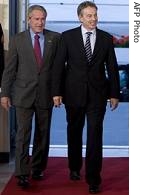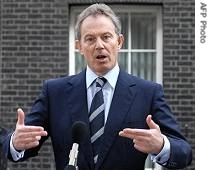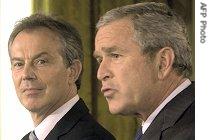-
(单词翻译:双击或拖选)
White House
26 June 2007
With the departure of Tony Blair this week as prime minister of Britain, U.S. President George Bush has lost his biggest ally in the war in Iraq. While he faced skepticism, and even open hostility1 from much of the rest of the world over the war in Iraq, President Bush could rely on Tony Blair to stand by him throughout, even as that loyalty2 eroded3 Mr. Blair's support at home. VOA White House Correspondent Scott Stearns looks back at the Bush-Blair relationship.
 |
| British PM Tony Blair (C) is greeted by US President George W. Bush (L) as he arrives at the White House, 17 May 2007 |
When the president stood before Congress following the terrorist attacks of September 11, 2001, Mr. Blair was there, sitting beside the First Lady.
"Once again, we are joined together in a great cause," said Mr. Bush. "I am so honored the British Prime Minister has crossed an ocean to show his unity5 with America. Thank you for coming, friend."
Public approval ratings for both men soared as they sent American and British forces against the Taleban in Afghanistan as part of a broadly backed fight against terrorism.
But much of that coalition6 failed to come together less than two years later when President Bush pushed for war against Saddam Hussein. Opposed by France, China and Russia, only Britain, among permanent members of the U.N. Security Council, backed the U.S. invasion.
Prime Minister Blair stood by the president at a sparsely7 attended pre-war summit in the Azores and during private meetings at Camp David, the presidential retreat.
 |
| British PM Tony Blair delivers a speech outside No. 10 Downing Street in central London, 05 Apr 2007 |
But public support for both the president and the prime minister began to fade as the war dragged on and no weapons of mass destruction were found.
"People still don't understand what on earth Blair was doing in joining the invasion of Iraq," said Rodney Barker, a professor of government at the London School of Economics.
Mr. Barker says Mr. Blair's allegiance with President Bush was so strong, that the prime minister himself suffered most politically, not his Labor9 Party, which remains10 in power with Gordon Brown taking over as government chief.
"Public opinion was against him. The churches were against him. The military was against him. The pope was against him. Pretty well everybody was against him," he added. "And he made it his crusade. 'I believe I am right.' The mission-driven politician. Well, that is rather good news for the Labor Party, because it means that people can associate Tony Blair with the war, what they see as George Bush and Tony Blair, not George Bush and New Labor."
Disgruntled Labor members complained that their leader too closely followed Mr. Bush. The president defended his friend against such accusations11 at a joint12 White House news conference.
REPORTER: "Mr. President, first, the prime minister is sometimes, perhaps unfairly, characterized in Britain as your poodle. I was wondering if that is the way you may see your relationship, and, perhaps, more seriously, do you feel…"

George Bush, Tony Blair at White House press conference, July 28, 2006
BLAIR: "Don't answer yes to that question, if you would. That would be difficult."
BUSH: "I admire him a lot. You know why? When he tells you something he means it."
Although analysts13 predict that Mr. Blair's legacy14 will be tarnished15 by his support of the Iraq war, President Bush says he does not know what history will make of his partnership16 with Prime Minister Blair, but he is not concerned.
Prime Minister Blair says he has tried to do what is right, and would ally himself with the president again, if he had to do it over.
Robert Hutchings is a former director of European Affairs on the U.S. National Security Council and is now a diplomat17 in residence at the Woodrow Wilson School of Public and International Affairs at Princeton University.
"This was Blair's decision," he noted18. "He made a calculation. He has said repeatedly that he firmly believed that he was doing the right thing. I don't have any reason to doubt that he believed that. I think he was wrong. I think the majority of Britons also think he was wrong."
When asked recently if Tony Blair's support for an unpopular war may have led him to step down early, Mr. Bush joked that, as he had not polled the Labor Party, he did not know. After a pause, Mr. Bush added, "could be."
 收听单词发音
收听单词发音
1
hostility

|
|
| n.敌对,敌意;抵制[pl.]交战,战争 | |
参考例句: |
|
|
|
2
loyalty

|
|
| n.忠诚,忠心 | |
参考例句: |
|
|
|
3
eroded

|
|
| adj. 被侵蚀的,有蚀痕的 动词erode的过去式和过去分词形式 | |
参考例句: |
|
|
|
4
solidarity

|
|
| n.团结;休戚相关 | |
参考例句: |
|
|
|
5
unity

|
|
| n.团结,联合,统一;和睦,协调 | |
参考例句: |
|
|
|
6
coalition

|
|
| n.结合体,同盟,结合,联合 | |
参考例句: |
|
|
|
7
sparsely

|
|
| adv.稀疏地;稀少地;不足地;贫乏地 | |
参考例句: |
|
|
|
8
liberate

|
|
| v.解放,使获得自由,释出,放出;vt.解放,使获自由 | |
参考例句: |
|
|
|
9
labor

|
|
| n.劳动,努力,工作,劳工;分娩;vi.劳动,努力,苦干;vt.详细分析;麻烦 | |
参考例句: |
|
|
|
10
remains

|
|
| n.剩余物,残留物;遗体,遗迹 | |
参考例句: |
|
|
|
11
accusations

|
|
| n.指责( accusation的名词复数 );指控;控告;(被告发、控告的)罪名 | |
参考例句: |
|
|
|
12
joint

|
|
| adj.联合的,共同的;n.关节,接合处;v.连接,贴合 | |
参考例句: |
|
|
|
13
analysts

|
|
| 分析家,化验员( analyst的名词复数 ) | |
参考例句: |
|
|
|
14
legacy

|
|
| n.遗产,遗赠;先人(或过去)留下的东西 | |
参考例句: |
|
|
|
15
tarnished

|
|
| (通常指金属)(使)失去光泽,(使)变灰暗( tarnish的过去式和过去分词 ); 玷污,败坏 | |
参考例句: |
|
|
|
16
partnership

|
|
| n.合作关系,伙伴关系 | |
参考例句: |
|
|
|
17
diplomat

|
|
| n.外交官,外交家;能交际的人,圆滑的人 | |
参考例句: |
|
|
|
18
noted

|
|
| adj.著名的,知名的 | |
参考例句: |
|
|
|















